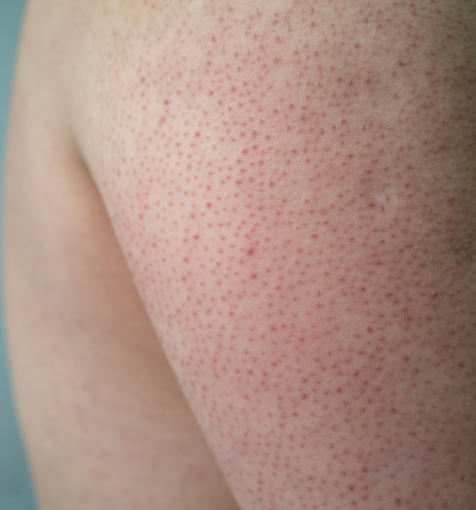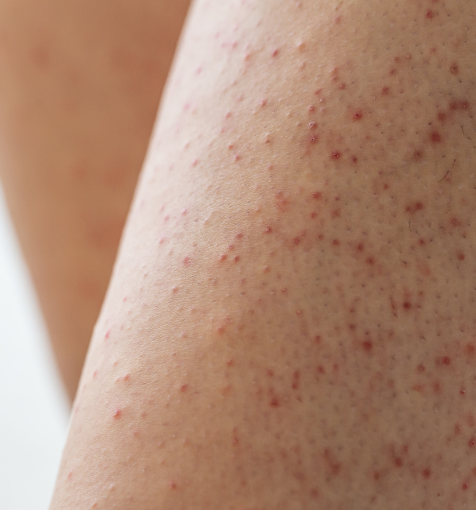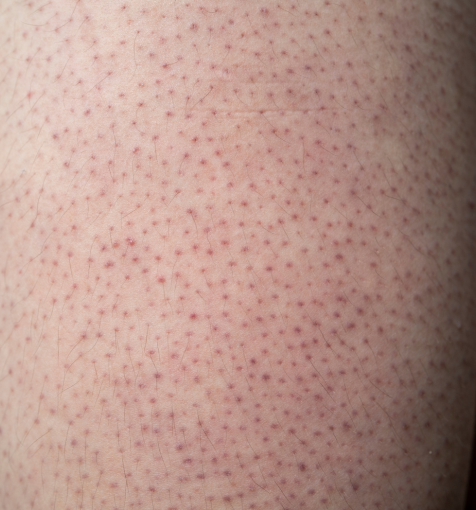Smoother Skin Solutions for Keratosis Pilaris in New Jersey
Keratosis pilaris is a common skin condition that causes rough, tiny bumps that resemble goosebumps or small pimples. These bumps are caused by dead skin cells plugging hair follicles and are most commonly found on the upper arms, thighs, and sometimes the cheeks. While keratosis pilaris is not harmful, many patients find it itchy, irritating, or cosmetically frustrating. At Skin & Laser Center of NJ, we provide treatment options to help smooth the skin’s texture and improve comfort, so you can feel more confident in your skin.


Keratosis pilaris is extremely common, affecting more than half of all teenagers and about 40 percent of adults. It often develops during childhood and adolescence, with flare-ups more likely to occur around puberty. For many, the condition improves or even resolves with age, but others may continue to experience symptoms into adulthood.
Risk factors that increase the likelihood of developing keratosis pilaris include:
Family history of the condition
Having fair or light skin
Associated skin conditions such as eczema or ichthyosis
Asthma, hay fever, or other allergies
Living in a dry climate or exposure to chlorine from frequent swimming
Certain medications, such as vemurafenib for melanoma
The condition itself is not dangerous, but the bumps can be persistent and bothersome, especially during colder months when the skin tends to be drier.
For many patients, keratosis pilaris eventually improves on its own. However, treatment may be helpful when symptoms include:
Rough, dry patches that feel like sandpaper
Itchiness, redness, or irritation
Self-consciousness about visible bumps on the arms, thighs, or cheeks
Flare-ups that become more frequent in winter or persist year-round
Even though keratosis pilaris does not cause long-term health problems, it can affect self-esteem and comfort. Professional treatment can help minimize flare-ups and smooth the appearance of the skin.


Our dermatologists tailor treatment to each patient’s needs, with options designed to reduce bumps, smooth texture, and restore hydration. Common approaches include:
Topical exfoliants – creams or lotions containing alpha hydroxy acids, lactic acid, or urea to help remove dead skin cells
Moisturizers – to improve hydration and reduce roughness
Prescription creams – stronger formulations that help reduce inflammation and promote skin turnover
Lifestyle guidance – tips for managing flare-ups, such as avoiding harsh soaps, using humidifiers in dry climates, and minimizing long, hot showers
While there is no permanent cure, consistent care and management significantly improve the skin’s appearance and comfort over time.
Learn More About Keratosis Pilaris
The first step in treating keratosis pilaris is a formal diagnosis. The providers at Skin & Laser Center of NJ can offer a diagnosis after discussing your health and medical history and conducting an examination of the skin lesions. This process is painless and usually takes a few minutes. After a diagnosis is made, we will discuss the best treatment options for you.
Many people with keratosis pilaris are unbothered by the condition and never seek professional treatment. For those who do find the condition to be uncomfortable, it can be treated topically with chemical exfoliants that work to remove the dead skin. Keratosis pilaris treatment at Skin & Laser Center of NJ is noninvasive and effective. The following topical treatments are popular methods for addressing the signs of keratosis pilaris:
Note that applying a moisturizing cream or ointment is effective, especially after bathing while the skin is still moist. This seals the water from the bath or shower into the skin so it can heal.
Patients may also benefit from routine exfoliation, though it is not recommended to do this more than once per week. Stopping treatment may cause the keratosis pilaris bumps to return.
Keratosis pilaris is different from acne, which develops as follicles are plugged by dead skin and oil, causing bacteria to multiply and form bumps on the surface of the skin. They are also different from moles, which are lesions that form from clusters of pigment-producing cells. If you are unsure about a growth, come to Skin & Laser Center of NJ for a diagnosis and treatment.
Convenient walk in hours available below. No appointment needed! Accepting private insurance and medicare. No medicaid plans.
Learn more about medical treatments at New Jersey’s Skin & Laser Center of NJ. Call 201-500-7525 or contact us online to schedule a consultation.